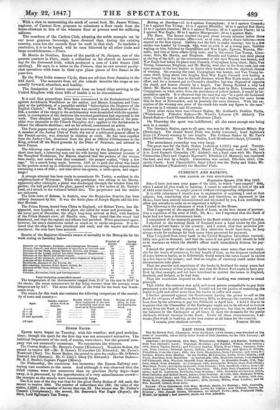CURRENCY AND BANKING.
TO THE EDITOR OF THE SPECTATOR.
Bryanston Square, 17th May 1847.
—I have just seen your paper of the 15th, in which "you suspect" that" when I asked fur free trade in banking, I meant to substitute in lieu of the act of 1814 some licence " to confer powers without corresponding obligations." It isavith reluctance I trouble you in explanation of anything 1 said on that sullied; but, considering that my words and intentions, as expressed in Also 1101111, have been entirely misunderstood and misstated by you, I ain unwilling to allow any mistake to exist on so important a milt. The following is the substance of what I stated to the House.
That I approved of the separate Bank of Issue, as the best means of prevent- ring a repetition of the error of 1825, '39, &c.; but I regretted that the Bank of Issue had not been a Government bank.
I complained of the monopoly granted to the Bank within sixty miles of London. I objected to the making Bank of England notes a legal tender by the joint stock and private banks in the country; and I stated, that that provision pre- vented these banks being obliged, as they otherwise would have been, to keep always ready for exchange for their notes when presented for payment. That I required from every bank in the United Kingdom immediate converti- bility into gold on demand; and that the notes if not paid in gold should be held to be warrants on which the sheriff's officer could immediately distress for pay- ment • I denied the power of the country banks to issue more notes than were requi- site for the wants of commerce, for any length of time, as the frequent exchanges of notes between banks, as in Edinburgh, would return the notes issued in excess in a few days to the issuers; and that no surplus of currency could under these circumstances take place. That the practice and experience of the banks in Scotland for many years bad proved the accuracy of that principle; and that Sir Robert Peel ought to have pro- fited by that example, and not have interfered to restrict the issues in England, Scotland, and Ireland, as he had done.
That the restriction imposed on the trade of banking was contrary to sound principle. That whilst the currency was gold, and every person compellable to pay their
prom justice
promissory notes in gold on demand, I could not see the justi of restricting the trader in gold and silver more than the trader in coffee and sugar.
I further protested against the Government having the power to call on the Bank for advances of millions on Deficiency Bills, to derange the currency, as had been done by the advances to pay the dividends in April last. I held it also to be requisite that the Chancellor of the Exchequer ought not to be allowed to borrow money from the Bank at his pleasure fir such purposes; but that he should have the balances in the Exchequer at all times to meet the demands for the public, dividends without recourse to the Bank. Under all these circumstances, I ad- vocate free trade in banking, as the hest course at all times for the country.


























 Previous page
Previous page